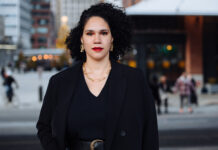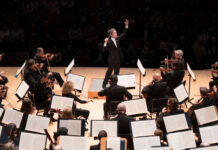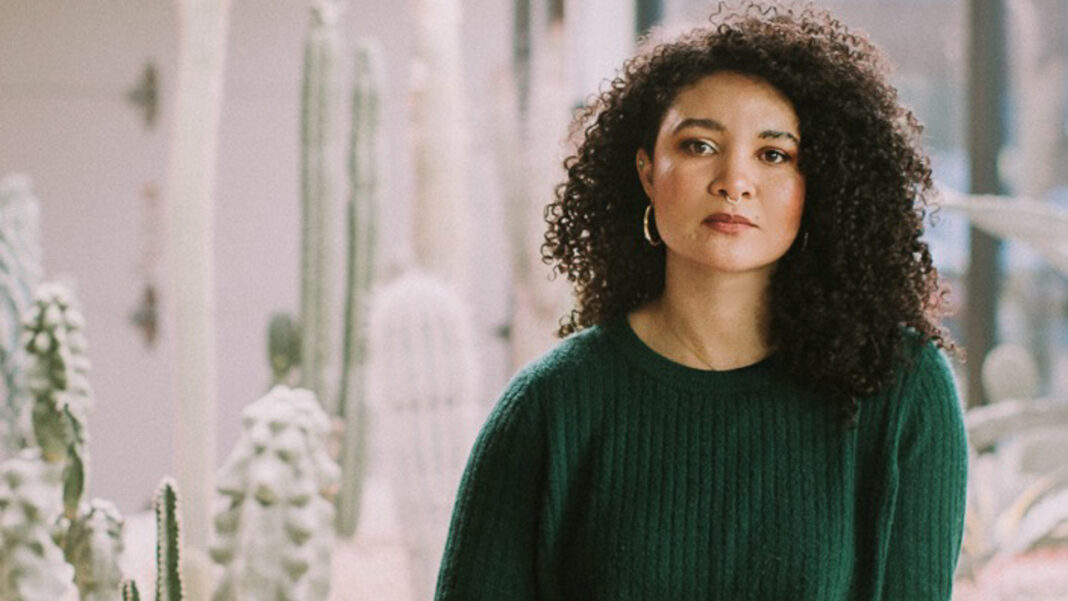
“I think some commissioners and ensembles want to commission composers and shine a light on them, let them write the music they want to share. But honestly, I think so much of it comes down to funding grant writing. There’s only so much money that we’re able to raise. Classical music is a very small niche field and there are listeners. But sometimes I feel like we all have $20 that we’re just handing back and forth to each other.” Composer Shelley Washington, like so many other composers, has to do battle for the same small amount of funding to be found to commission new works.
As part of Los Angeles Chamber Orchestra’s Sound Investment program, Washington was able to get a commission to write Both, which is having its West Coast Premiere this weekend in a pair of performances by LACO.
“I recognize how lucky I am to have been able to keep working and studying and that people believe in me and still like me enough to commission me, which is nice,” she said last month during a Zoom conversation. “But it’s not easy out there. I know people want to commission composers, but I feel like the most prohibitive thing is funding and it’s hard to find that. But when it works, it works.”
Both, which explores multiple layers of duality inspired by her own life, marks a rare opportunity for Washington to write a longer work.
“I have so many ten or 15 minute pieces and this is an amazing opportunity for me to get to write something more substantial,” she says of the thirty-minute Both which was commissioned by LACO’s Sound Investment audience-supported commissioning initiative along with other partners through New Music USA’s Amplifying Voices program. “There’s always the hesitation of, well, our audiences don’t have the attention span, in parentheses, for contemporary music because they won’t like it and will stop coming, which is an unspoken thing. I’m like, you are discrediting your audience. You’re not giving them the opportunity to explore and I feel like it’s undermining them. I would be offended if a conductor got on stage and was like, Your tiny people brains are not capable of enjoying something new.”
In addition to working as a composer, Washington is an accomplished vocalist who also plays flute, piccolo and clarinet. In press materials for Both she is quoted as saying “This piece is meant to reflect the fact that you and I both are not either/or, and that so many things and people, even seemingly places, are not the binary they’ve been billed to us as, but a spectrum from point to point.”
Which sounds like a lot to get across in a 30-minute work, but Washington utilized little tricks that she hopes will allow listeners into the world she has created.
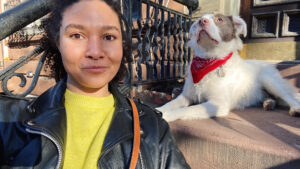
“There are lots of broad things and also small things that the listener, they might be more secretive,” she offered as she began insight into how she viewed Both. “If someone were to look at a score, they’d be like, Ah ha! It’s a fun little trick. There’s the old school mentality that if you’re writing cute tonal music, it’s not serious, it’s not as respectable as blah, blah, blah, other things. So the second movement I wrote intentionally to be the cutest thing I’ve ever written and there’s a rhythmic thread that that begins in that movement and that actually continues on in a totally different context later on.
“There aren’t rules necessarily but I guess you’re giving the composer the autonomy to go buck wild. That’s also not always an accepted thing, but in more seasoned contextualization of themes, it’s pretty present and it spreads between all four of them. So the culmination of all of that is in the fourth movement. There’s a really fun rhythmic puzzle of the two, I guess three against four against five. It’s all happening at the same time, which I think might be initially kind of uncomfortable to listen to because it’s hard to grasp about where the ground is. But then as you sit back into it, I hope for the audience is that they’re able to find their own footing within that and have the ability to listen to it in a bunch of different ways. Me giving them an opportunity to find themselves in is another kind of give and take of the either or aspect of it.”
It might surprise some to find that Washington has described one movement, 11:30 p.m. to 4:30 a.m., as the movement that “shreds metal.” Not a common description of the Los Angeles Chamber Orchestra. But Washington disagrees.
“I’ve heard it done before and I am stoked to hear them do it again.” She continues to discuss a concert she and Derrick Skye curated for LACO where she brought in a close friend who had the orchestra doing some things you wouldn’t expect.
“I got to bring one of my very dear friends here, Aeryn Santillan, a composer who comes out of the DIY screamo scene. She is an incredible guitarist and the band that she’s in, Massa Nera, uses lots of yelling, very loud, lots of really intricate rhythmic stuff. So that seeps into her chamber music in so many wonderful ways, including vocals and vocalizing and singing. So the string quartets that they played, they were not just singing, but screaming and shouting lyrics, which is not something they get to do all the time.”
During the process of composing Both, Washington faced personal challenges that, though she didn’t specify them, clearly left a mark on her and challenged her getting this composition completed.
“In my process, historically, I do a lot of just thinking, which honestly sounds kind of lame, but I conceptualize. I gather musical intel and it sits on the mental back burner for months and months. And then at the very end when I should write this out, it’s this incredibly fast, intense blitz of just brain vomit onto page.
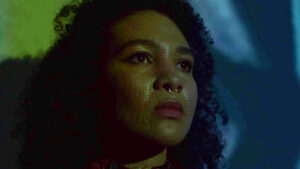
“So I had a very tough spring of last year from April, May, June. And so March is when I’m going to start actually putting down notes on the page. But then something very significant happened that was emotionally taxing and then something else, then something else, and then something else. I’m very proud of myself for working through all of this, but the Lord tested me in ways that I was sad about. So I ended up, and I’m certain that people are going to hate hearing this, but I wrote all of that music in about nine days of actually getting it down from brain to page. I now know that I am capable of anything on the planet, that there is nothing that I cannot do. But that really pushed the limits of what I thought I was capable of doing. I like this piece a lot. And it is not something that I was like, Oh, man, I’m going to write down some fluffy stuff to get through it. I really like it very much. So I’m not going to be writing a half hour piece in nine days ever again.”
The duality of Washington’s life obviously continues with work and life. So when I ask her about English writer Alan Watts who said, “Every explicit duality is an implicit unity,” Washington not only agrees, but reveals the challenges she’s faced in accepting herself.
“I feel like my life had a very stark divide from when I was not a composer, but loved music and was a very active participant. And when I became a composer and put the hat on, I told people I write music. I moved to New York and this life started. However, every other aspect of my life still comes into this role. We are the product of our past. We are the accumulation of everything we’ve said or done. Our brains and our subconscious holds on to a vast majority of these things, and while we don’t consciously think about them, they’re still present. Even if you think, ‘Oh man, I’ve really changed my life, I would never do that again,’ you can’t say that because we don’t always consciously make the choices. Our subconscious does so much behind our backs, but it’s a part of you.
“Good things that you like about yourself, the flaws that you think you might have; for me embracing all of these aspects of myself has been really healing, especially in the last like three or four years. I’ve been working with Shadow Working, which is like Carl Jung’s concept of your shadow self, which is really digging deep and accepting things that you don’t find about yourself or that other people – whatever labels they place upon you. No, no, you don’t get to make these decisions about life I do, but I also have to accept all of these aspects of myself. So I have befriended the past parts of my life. They are not bad and just working through all of that. So I hope this piece doesn’t give permission, but acceptance, to people. I hope that they can hear something or at least maybe read the program note and think, ‘Oh, it’s okay. I like myself.’ Hopefully see themselves and feel seen. That’s what I would like.”
Update: Just as we were about to post this interview, Long Beach Opera announced that they have named Shelley Washington their Composer-In-Residence. Congratulations!
To see our complete interview with Shelley Washington, please go here.
Main Photo: Composer Shelley Washington/Courtesy Shelley Washington


